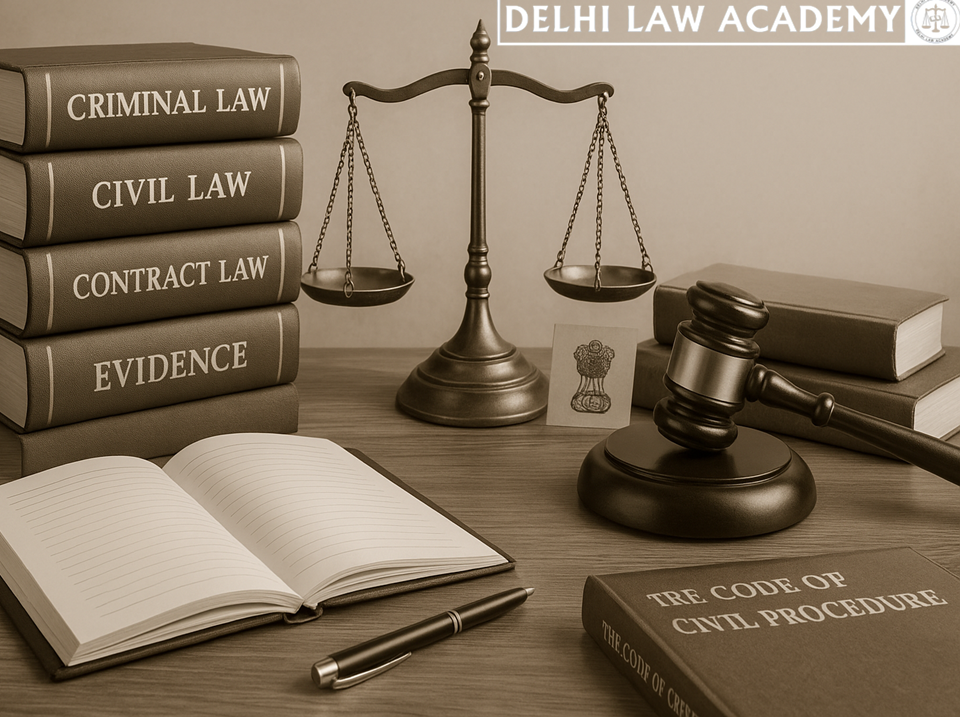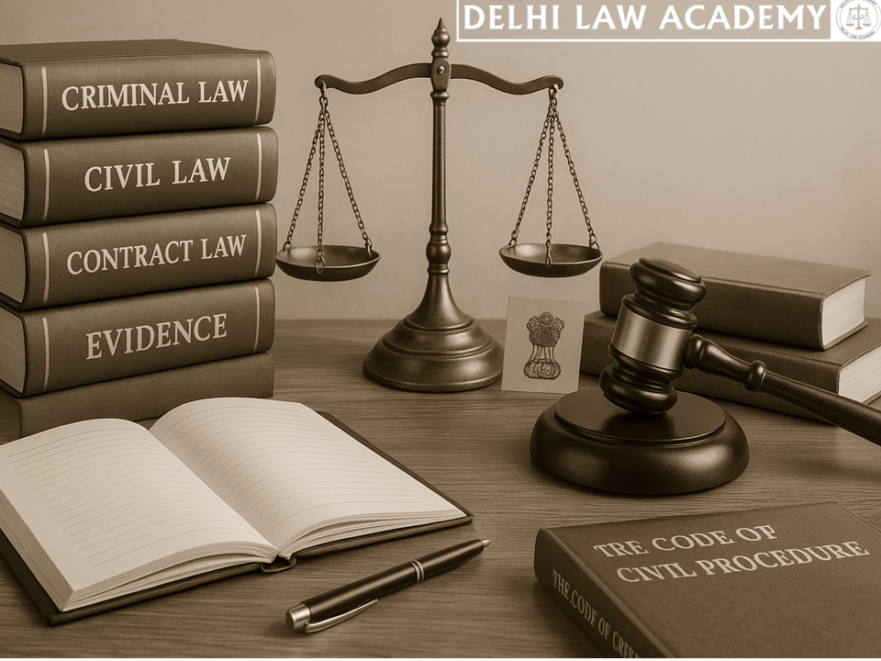
📝 Judgment Writing Tips for Judicial Services Exams
📌 Topics Covered
- How to write a balanced judgment?
- The art of judgment writing
- Judgment writing for RJS, DJS and other Judicial Services exams
- Judgment writing in civil cases
⚖️ JUDGMENT WRITING
Subtle nuances of judgment writing are explained hereunder by an expert from Delhi Law Academy Jaipur with the help of an actual question from Rajasthan Judicial Service Mains Exam 2018: Law Paper I:
Q 24:
Write a reasoned judgment on the following facts:
📄 Pleadings of the suit
Plaintiff and defendant are familiar to each other. On 17.07.2014, for the sake of personal necessity, the defendant borrowed Rs. 187690 from the plaintiff and agreed to return the money after one year with 20% annual rate of interest and accordingly a written agreement was executed. After stipulated period, despite demand, defendant did not return the principal amount and the return thereon. Plaintiff sought decree of Rs. 256115 along with suit expenses and interest till realization of the amount.
📄 Pleadings of the written statement
The defendant categorically denied the pleadings in the plaint and also denied the execution of agreement. The defendant pleaded that the alleged borrowed amount is in odd figure. Ordinarily, amount is not borrowed in odd figure. This fact itself makes claim highly doubtful. It is also pleaded that the defendant constructed the plaintiff’s house and payment of which is still due towards the plaintiff. The plaintiff does not want to pay the due amount, therefore he has filed false case against him. He prayed to dismiss the suit with heavy costs.
💡 Advice from Delhi Law Academy Jaipur
Every serious Judicial Service aspirant is earnestly advised to first attempt this question at his/her own level and prepare a judgment himself/herself. Take 20-25 minutes. Then, scroll down and peruse the Model Answer prepared by Delhi Law Academy [www.delhilawacademy.com].
This would enable you to assess the difficulty level of the examination and the need to look for a competent teacher/guide.
📑 MODEL ANSWER BY DELHI LAW ACADEMY
Court of Civil Judge .................................... Presiding Officer: .............................…….. Civil Original Suit No. ……............../2019 P ………………… s/o….................., aged….........years Resident of……………………………………………………….. ..............Plaintiff v. D ………………… s/o…..................., aged….........years Resident of……………………………………………………….. ...........Defendant SUIT FOR RECOVERY OF MONEY Present: Shri ...............……………………………., Counsel for the plaintiff Shri ...............……………………………., Counsel for the defendant
JUDGMENT
Plaintiff P filed this suit against defendant D seeking a decree of Rs. 256115 along with suit expenses and interest till realization of the amount. Plaintiff pleaded that the defendant had borrowed Rs. 187690 from him on an annual interest rate of 20% with a promise to return the same after one year. He pleaded that a written agreement was accordingly executed. However, the defendant failed to return the money after the stipulated period despite demand.
The defendant in his pleadings denied the borrowal as well as execution of any agreement. The following issues were framed on the pleadings of the parties:
- (1) Whether the defendant had borrowed Rs. 187690 from the plaintiff on 17.7.14 on interest?
- (2) Whether a written agreement was executed between the plaintiff and the defendant concerning borrowal of money by the defendant from the plaintiff?
Plaintiff P examined himself as PW1 and deposed that the defendant had borrowed Rs. 187690 from him on 17.7.14 and that a written agreement was executed between them detailing the transaction along with the rate of interest and the time of return. He also produced a document Ex P1, purporting to be an agreement between the plaintiff and the defendant concerning borrowing of money by the defendant from the plaintiff.
Defendant D examined himself as DW1. He denied having borrowed any money from the plaintiff. He also denied having executed the disputed agreement Ex P1.
To resolve the dispute concerning authenticity of the disputed document Ex P1, this Court referred to a handwriting expert the following two documents:
- (1) Disputed document Ex P1 which purportedly carried the signatures of the defendant
- (2) The written statement which admittedly was signed by the defendant
The expert was asked to give his opinion whether the defendant’s disputed signatures on Ex P1 matched with his admitted signatures on the written statement submitted by him to the Court. The opinion of the expert was received and recorded as Ex P2. Thereafter, the expert deposed before the Court as CW1 and he testified that the opinion recorded in PW2 was his own wherein he opined that the signatures of defendant on both the documents referred to him matched.
Counsels of both the parties made their submissions before the court. Counsel of the defendant submitted that the opinion of the expert, although relevant u/s 45 of the Indian Evidence Act, is just an opinion and it by itself cannot clinch the issue in favour of the plaintiff.
I have carefully considered the evidence brought on record by both parties and the arguments advanced by their counsels.
With due regard to the submissions of the learned counsel for the defendant, I myself perused Ex P1. Signatures of the defendant on the disputed agreement Ex P1 as well as his signatures on his written statement are in Hindi. Since I am fully familiar with the language, I myself compared defendant’s disputed signatures on Ex P1 with his admitted signatures on his written statement and I found them to be matching.
On due appreciation of the evidence including the expert opinion and my own comparison of the disputed signatures with the admitted signatures of the defendant, I decide both the issues in favour of the plaintiff.
I find support from the judgment of Hon’ble Supreme Court in Ram Narain v. State of U.P. [1973] where the Court found the expert opinion reliable and worthy of conviction once it was corroborated by the trial judge’s own comparison of the two handwritings.
The Hon’ble Supreme Court had observed in that case that the opinion evidence may be worthy of acceptance if there is internal or external evidence relating to the document in question supporting the view expressed by the expert. It was then held that such opinion evidence can be relied upon if after comparison of the disputed and the admitted writings by the court itself, when the Presiding Officer is familiar with that language, it is considered safe to accept the expert opinion.
I accordingly hold that the defendant had borrowed Rs 187690 from the plaintiff and had also executed an agreement to that effect.
Once the agreement and the borrowal are held to be genuine, the oddness of the borrowed amount becomes immaterial. The claim of the defendant regarding construction of plaintiff’s house has no bearing on the issue of his borrowal of money and is thus disregarded.
It is accordingly held that the plaintiff is entitled to recover his principal money along with the stipulated interest till the date of realization of the amount. He is also entitled to recover costs from the defendant.
Sd/-
Civil Judge ………………………………………..
Judgment signed and pronounced in open Court today the ……..……………………
Seal of the Court
📘 Free Study Material for RJS Aspirants!
Want a head start in your RJS Coaching in Jaipur preparation?
Download our FREE study material prepared by Delhi Law Academy’s expert faculty.
❓ FAQs on Judgment Writing for Judicial Services
Judgment writing tests a candidate’s ability to analyze facts, apply the law logically, and present a balanced reasoning. It is a key part of mains exams like RJS, DJS, and other PCS(J) papers.
A proper judgment should include: case heading, pleadings, issues framed, evidence discussed, reasoning, citations if possible, and a clear conclusion with the order of the court.
It checks legal knowledge, analytical skills, clarity of thought, precision in writing, and the ability to maintain judicial balance and impartiality.
Practice past exam questions, write within time limits, compare your answers with model judgments, and seek feedback from mentors or coaching academies like Delhi Law Academy.
Yes, where relevant. While not always mandatory in exams, citing leading judgments of the Supreme Court or High Courts shows depth of knowledge and strengthens your reasoning.
Contact us
📍 Delhi Law Academy – Jaipur Branch
6C, Tower 2, Coaching Hub, Pratap Nagar, Jaipur – 302033
📞 Phone:
+91 9911916552
+91 8447285606
✉️ Email:
contactus@delhilawacademy.com

